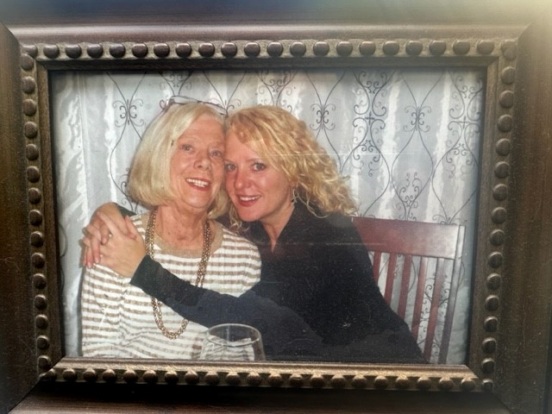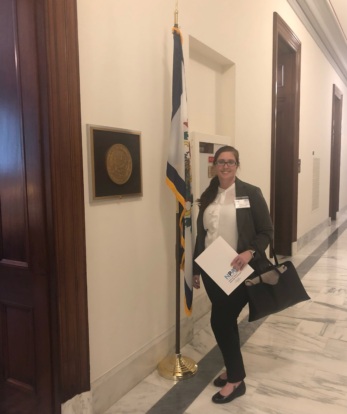Equity, Palliative Care

Melissa Williams interviews Faye Hollowell and Sa'Brina Davis, NPAF volunteers, about their experience representing patients and caregivers in a key advisory meeting.
By Melissa Williams
It’s no secret that here at NPAF our vision is to bring person-centered care everywhere. We want it to be demanded by all patients and caregivers and integrated into all care settings.
This vision is why we’ve been such strong advocates for community-based palliative care. The foundation of palliative care is based on person-centered principles: communicating with empathy; involving caregivers; and acknowledging that patient values and preferences are a fundamental part of delivering quality care. For this reason, NPAF supports state and federal legislation aimed at raising public awareness of palliative care and making training available to clinicians who treat people with serious illnesses.
NPAF has also launched a new community education initiative called “Can We Talk?”, in which we go directly into communities and hold communication skills-training for patients and caregivers so they are better prepared to talk about the things that matter with the people who matter. Our goal is to help patients and health care professionals communicate in ways that foster shared decision-making and build community demand for person-centered care.
NPAF has been instrumental in bringing the voices of patients and caregivers into conversations about care delivery where it matters. In our cost of care webinar series, our volunteers served as faculty sharing their individual experiences and expertise on topics ranging from financial toxicity and caregiving to health inequities and costs of new treatments. We have prominently included patient and caregiver voices at our Policy Consortium as well as at the National Academies of Science Engineering and Medicine Roundtable on Quality Care for People With Serious Illness. Moreover, we have also been influential in placing patients and/or caregivers in focus groups, state taskforces and advisory councils where key decisions are taking place directly impacting care quality and delivery.
Most recently two NPAF volunteers, Sa’Brina Davis and Faye Hollowell, together with NPAF’s Rebecca Kirch were invited to serve on the Technical Expert Clinical User Patient Panel (TECUPP) as part of the Medicare Access and CHIP Authorization Act of 2015 (MACRA) Person-Centered Quality Measures Development Project. This project is being led by American Academy of Hospice and Palliative Medicine (AAHPM), in partnership with the National Coalition for Hospice and Palliative Care (Coalition) and the RAND Corporation, after it was awarded a three-year grant from Centers for Medicare and Medicaid Services (CMS) to develop patient-reported quality measures for community-based palliative care.
NPAF has been a key partner in this project from its inception. Rebecca assisted AAHPM in developing the measures and grant proposal that was successfully submitted and awarded by CMS, and Patient Advocate Foundation helped the project team identify patients and caregivers from across the country to participate in focus groups and interviews providing feedback on what is most important to patients and families.
As part of the TECUPP, representatives from NPAF join a number of other health care stakeholders including physicians, nurses, health policy professionals, and researchers. Our NPAF volunteers are the only panelists representing patient and caregiver perspectives and are drawing from their individual experiences and expertise to support the quality measures development and refinement. The first TECUPP meeting was in Chicago in April.
Never before have patients or caregivers have been included in this magnitude in quality measures development. Understanding their expert roles in the panel, both Sa’Brina (SD) and Faye (FH) have shared some thoughts about their experience being a part of the TECUPP and the quality measures development process.
SD: Overall, this has been a humbling experience. There are significant unmet needs among seriously ill people. As a TECUPP panelist, I consider it an honor to communicate patient, caregiver and/family member perspectives especially as clinicians attempt to formalize training on how to effectively communicate with patients.
FH: I learned and experienced so many new things about person-centered care in the one day meeting. As panelists, it is our job to ensure that the overall quality of the patient’s experience is considered in quality measures development, specifically addressing patients’ unmet needs and acknowledging whether patients feel listened to.
SD: I think patients and caregivers have an important role in harmonizing and refining quality measures specifications taking into account all perspectives: patient, caregiver and clinicians. When it comes to delivering care, it is imperative for clinicians to learn of patient and caregiver needs before attempting to set initiatives that ensure care is administered with dignity, respect and autonomy in serious illness care. As a TECUPP panelist, my goal is to help direct the focus of the quality measures discussion to one that incorporates personal preferences and leads to patient-reported outcomes.
FH: Patient and caregivers can help medical providers move from assessing “what’s the matter” with a patient to “what matters.” Ultimately, this shift in thinking can create a mutual relationship where clinicians can help patients to best attain their non-medical goals.
SD: Learning about the hurdles clinicians face when attempting to administer person-centered care completes my view of how health care is administered and how it can be improved. I would advise anyone interested in participating in a similar initiative to actively volunteer with NPAF or other disease-specific foundations. I believe the best way to address patient needs is to listen to patient stories and identify ways to strengthen patient, caregiver and provider relationships.
FH: Other patients, caregivers and advocates should welcome an opportunity to be the patient/caregiver voice and know that they too are experts of their own individual circumstance which is valuable in creating person-centered quality measures for patients.
The next step for Sa’Brina, Faye and the other TECUPP panelists is to test the data elements that will be used to build the proposed quality measures. This will be rolled out as a small pilot study, then national field test. We look forward to hearing more from them throughout the duration of this project.
NPAF is making incredible strides in shaping person-centered care delivery not only from the bottom up, but also from the top down. We are proud of what we’ve accomplished and all the hard work our volunteers have done to spread the importance of person-centered care, but this is just the beginning. We are excited for the work that still needs to happen and, as always, welcome your input to continue to put patient and caregiver voices at the heart of health care.
Equity, Palliative Care
Care Planning, Caregiving, COVID, Needs Navigation, Palliative Care
Caregiving, Equity, Health Literacy, Insurance, Palliative Care
Care Planning, Health Literacy, Needs Navigation, Palliative Care



